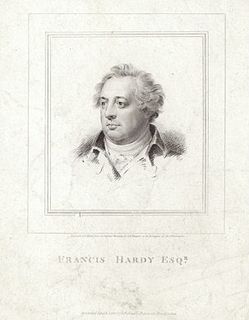Related Research Articles

Trinity College, officially The Provost, Fellows, Foundation Scholars and the other members of Board, of the College of the Holy and Undivided Trinity of Queen Elizabeth near Dublin, is the sole constituent college of the University of Dublin, a research university in Dublin, Ireland. Queen Elizabeth I founded the college in 1592 as "the mother of a university" that was modelled after the collegiate universities of Oxford and Cambridge, but unlike these affiliated institutions, only one college was ever established; as such, the designations "Trinity College" and "University of Dublin" are usually synonymous for practical purposes.

James Caulfeild, 1st Earl of Charlemont KP PC (Ire) was an Irish statesman.

William Conyngham Plunket, 1st Baron Plunket, PC (Ire), QC was an Irish politician and lawyer. After gaining public notoriety as the prosecutor in the treason trial of Robert Emmet in 1803, he rose rapidly in government service. He become Lord Chancellor of Ireland in 1830 and served, with a brief interruption, in that post until his retirement in 1841.

Sir Phelim Roe O'Neill of Kinard was an Irish politician and soldier who started the Irish rebellion in Ulster on 23 October 1641. He joined the Irish Catholic Confederation in 1642 and fought in the Wars of the Three Kingdoms under his cousin, Owen Roe O'Neill, in the Confederate Ulster Army. After the Cromwellian conquest of Ireland O’Neill went into hiding but was captured, tried and executed in 1653.
William Bedell Stanford was an Irish classical scholar and senator. He was Regius Professor of Greek at Trinity College Dublin between 1940 and 1980 and served as the 22nd chancellor of the university between 1982 and 1984.
Donnycarney is a Northside suburb in the city of Dublin, Ireland, in the jurisdiction of Dublin City Council. It is mostly residential, around 5 kilometres (3.1 mi) from the centre of Dublin. Dublin GAA's home stadium, Parnell Park, is located here.

Marino Institute of Education is an Irish College of Education, an associated College of Trinity College Dublin. It is located on Griffith Avenue, Dublin 9. Marino Institute of Education is focused on providing education courses. Its degrees and diplomas are awarded by the University of Dublin, Trinity College. Marino Institute of Education follows the tradition of care through education established by Edmund Rice. Marino Institute of Education comprises the College of Education, the Conference Centre, Continuing Professional Development (CPD) and various support services.
Colonel John Caulfeild (1661–1707), styled The Honourable from birth, was an Irish soldier and politician.

Charles Lucas was an Irish apothecary, physician and politician. He sat as Member of Parliament for Dublin City and was known as the "Irish Wilkes" because of his radical views.
Francis Bernard SL was an Irish lawyer, politician and judge.
James Margetson was an English churchman, Church of Ireland Archbishop of Armagh from 1663 till 1678.
Philip Skelton (1707–1787) was an Irish Protestant clergyman and writer.
Caulfield is a surname of several separate origins. The name is usually a simplified form of a number of Gaelic surnames, often MacCathmhaoil, an Ulster family traditionally descended from Niall of the Nine Hostages. Also known to be an anglicized form of Mac Eoghain, Mac Caomhanaigh, O'Gamhnain, and O'Gamhna. Occasionally confused with Caulfeild, an unrelated Anglo-Irish family. People with this surname include:
Edward Adderley Stopford (1810–1874) was an Irish Anglican priest.

Francis Hardy (1751–1812) was an Irish barrister, politician and biographer.
William Caulfeild, 2nd Viscount Charlemont was an Irish soldier and peer.
Edward How was an Anglican Archdeacon in Ireland in the late 17th-century.
Stephen Bernard was an Irish politician.
Francis Caulfeild was an Irish politician.

Marino House and gardens was a Georgian house and estate in Marino in the northern suburbs of Dublin, Ireland constructed sometime around 1755 and later remodeled by William Chambers for James Caulfeild, 1st Earl of Charlemont. Chambers later also designed Charlemont House on nearby Rutland Square for Lord Charlemont.
References
- ↑ "Alumni Dublinenses : a register of the students, graduates, professors and provosts of Trinity College in the University of Dublin (1593–1860)" George Dames Burtchaell/Thomas Ulick Sadleir p1: Dublin, Alex Thom and Co, 1935
- ↑ "Leigh Rayment - Irish House of Commons 1692-1800". Archived from the original on 1 June 2009. Retrieved 4 June 2020.
{{cite web}}: CS1 maint: unfit URL (link)